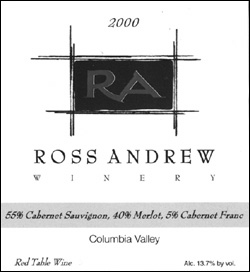The ancient folkways of the grape never really took root in North America, so it’s understandable if our winemakers’ tales are fraught with epiphanies: sudden midlife course corrections, abrupt trade-ins of hot urban concrete for cool Mother Earth. Maybe it’s a sign that wine has finally gone native that an easygoing Bellevue boy could drift into winemaking as if it were the most natural move in the world.
An English major at the University of Washington, Ross Mickel had his first brush with the wine game when a childhood friend suggested he work as a wine waiter at the friend’s family’s restaurant. Since the childhood friend was Mark Canlis, Mickel abruptly found himself counseling some of the region’s wealthiest and most knowledgeable wine consumers on their beverage choices before he was all that secure in the subject himself.
Once in the wine bag, Mickel got serious, flying to UC Davis for weekend winemaking classes, with luck and contacts at home ensuring that theory got blended with practice. A college classmate working at Woodinville’s DeLille Cellars introduced Mickel to DeLille winemaker Chris Upchurch, who put him to work as a “rat” around the winery. In another lucky twist, Ste. Michelle winemaker Bob Betz was using DeLille’s plant to produce his own wines, and Mickel soon found himself assisting one of America’s most admired winemakers in crafting his spare-no-expense boutique syrahs and Bordeaux-style blends. In 1999, Mickel produced his first solo wine from the 2000 harvest, a fairly standard “meritage” blend of 55 percent cabernet sauvignon grapes, 40 percent merlot, and 5 percent cabernet franc. But thanks to his reflected credibility from Master of Wine Betz, Mickel was able to procure grapes from some of Washington’s best growing sites, including Alder Ridge, Milbrandt, and Taptiel.
Briskly tannic without raspiness, refreshingly acidic, the three-year-old wine favors fruitiness over weight, a distinct advantage when most Washington reds, no matter how gnarlyexcuse me, “age-worthy”are consumed the year of their release.
Mickel is delighted at the reception his debutant is getting. “I think people I know who taste it are thinking, ‘What can I say nice about it?’ because after they do, they say, ‘I like it! No, I really like it.” He’ll have no trouble placing the mere 200 cases made at about $25 per bottle. That won’t come close to paying off what Mickel and his partners (“well, parents”) have invested in the enterprise so far, but it’s a great base to build on.
On the threshold of wider recognition, does he regret not having a more stormy tale of struggle to tell? “Not really; I’ve been lucky, sure. But looking back, it seems like it was all just meant to be.”








